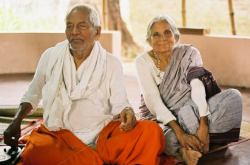An Evening With Krishnammal
November 12, 7:30PM
Santa Clara, CA
In her early twenties, she often traveled with Gandhi and sang songs at his independence protests. After marriage, she joined Vinoba Bhave's Bhoodan movement to walk tens of thousands of miles for the landless. In 1959, she hosted a visiting Martin Luther King, Jr. In 2008, for holding the beacon of Gandhian legacy into the 21st century, 82 year old Krishnammal received the Opus Prize and the Right Livelihood Award and is nominated for the Nobel Peace Prize.
Those are all impressive credentials, until you read further into the story of Krishnammal Jagannathan. Despite being born into a poor Dalit (untouchable) family, she was the first woman in her community to graduate from college. Right after a paradigm bending marriage to a Brahmin man, she took a vow to join him on a walking pilgrimage for the landless -- that kept them without a home or possessions for the next 15 years! Because they didn't own anything and required very little for their sustenance, this married duo kept moving to areas of intense conflict and spent decades in giving voice to the unheard. Today, their work has organized itself into an organization called LAFTI and touched millions of lives, as many leaders have declared them "the soul of India."
 On November 12th, we will have the distinguished honor of hosting Krishnammal (often called "Amma") amongst us, as she will share stories from a lifetime of service. This event is hosted in our home and there is no cost to attend; please RSVP for more details (and as always we can only accommodate the first 80 RSVP's).
On November 12th, we will have the distinguished honor of hosting Krishnammal (often called "Amma") amongst us, as she will share stories from a lifetime of service. This event is hosted in our home and there is no cost to attend; please RSVP for more details (and as always we can only accommodate the first 80 RSVP's).
About Krishnamaal
David Albert, in Color of Freedom, offers this inspiring introduction to Krishnammal and Jagannathan:
"If our heroes were painters on a canvas, the first and primary color for the entire work would be the color of freedom. Somewhere along the line, both Amma and Appa attached themselves to the rather unusual notion that, that having cast off al semblances of slavishness, they could be the authors of their own lives, and in doing so, spent their lives enabling others to give authorship to their own as well.
They think nothing of moving to a village hundreds of miles from their home, where they have never been and where they know no one, because they have read in the newspaper that people have been killed, and they truly believe they can make a difference. They will transplant themselves thousands of miles away to another state, where their own native language isn't even spoken, and spend seven months sleeping literally in pigsties, and living on boiled potato leaves, in order to impede keepers of temples from treating people unfairly. They walk freely out of police vans to which they have been confined, and lie down in front of trucks and bulldozers in protest. They wear clothing made only of thread they have spun themselves, and if they haven't had enough time to spin, their clothing will be threadbare.
When in prison, they demand the right to wash their own clothes, and make it possible for everyone to do so as well. They make new bank rules for the bankers, adopt and take it upon themselves to feed, clothe and house and educate several hundred children at a time, and find laws and their application where no one thought there were any. It is disorienting at first, but ultimately liberating. No one who has ever met Amma and Appa goes away unchanged.
The source of this freedom is not easily knowable, although it is possible to catch glimpses of it. It is certainly not the usual response to life of a woman who grows up in the poorest possible household, with 12 children born into it, and headed by an alcoholic and wife-beating husband who dies, leaves a widow to work both day and night to fend for them all. But even there there are hints, as Krishnammal's mother finds and feeds handicapped people even poorer than herself, and begins each day facing the rising sun with a prayer. Krishnammal begings to experience small acts of kindness that do not have to be reserved to the wealthy. Anyone who ever meets Amma cannot fail to notice that even when she does not have a rupee in her pocket, she acts and speaks as if she is rich in abundance, knowing that she will be provided for. She is a queen without a palace, an empress without a treasury, a pauper whose beneficence animates virtually everything she touches."
Read More ...
- Right Liveliehood Award: with Amy Goodman, recipient of a prestigious award in 2008.
- LAFTI: Land for Tillers' Freedom, the umbrella organization for the work of Jagannathans.
- Friends of LAFTI: international support for the work of LAFTI.
- David Albert's Blog: most recent news.
